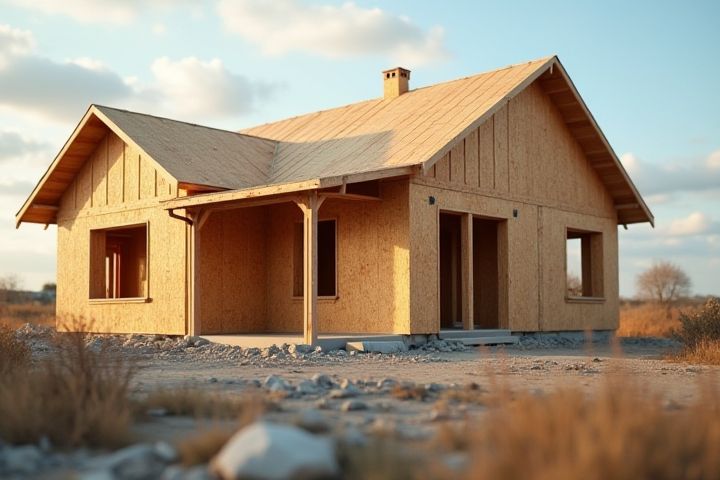
The duration of house construction varies significantly based on factors such as the size, complexity, and design of the home, as well as local regulations and weather conditions. On average, building a single-family home typically takes between six months to a year to complete. Custom homes or those with intricate architectural features may require additional time, often expanding to 12 to 18 months. Key phases of construction include site preparation, foundation work, framing, electrical and plumbing installations, and finishing touches like flooring and painting. For a precise timeline, it's essential to consult with your contractor and understand the specific requirements of your project.
How Long Does A House Construction Take
Project Complexity
House construction duration significantly varies with project complexity, generally ranging from 6 months to over 2 years. For a simple one-story home, expect approximately 6 to 12 months, whereas multi-story structures or custom designs can extend this timeline to 12 to 24 months or more. Factors influencing this duration include architectural design, local regulations, and the availability of materials and labor. Understanding these elements can help you plan your own construction project more effectively, ensuring timely completion.
Size of the House
The duration of house construction significantly depends on the size and complexity of the project. A small single-story home can typically be completed in about 4 to 6 months, while a medium-sized house may take around 6 to 9 months to finish. Larger, multi-story homes often require 9 months to over a year due to intricate design elements, additional inspections, and extensive labor. Understanding these timelines can help you plan better for your move-in date and manage your expectations throughout the construction process.
Weather Conditions
House construction typically takes between six months to over a year, heavily influenced by weather conditions. For instance, prolonged rain can delay foundation work and lead to soil erosion, while extreme heat may impede concrete setting and compromise safety. In regions prone to heavy snowfall, winter can halt progress for several months, while warmer climates may allow for year-round construction but bring challenges like heat exhaustion for workers. Monitoring local weather patterns is vital for your construction timeline, ensuring you can adapt to unforeseen delays.
Local Regulations and Permits
The duration of house construction can vary significantly based on local regulations and permits, which are essential for legal compliance. Typically, acquiring necessary permits such as building, zoning, and environmental permits may take anywhere from a few weeks to several months, depending on the municipal processes in your area. After the permits are secured, the actual construction phase can last from a few months to over a year, influenced by factors like design complexity and contractor availability. Make sure to check with your local building department for specific timelines and requirements that apply to your project.
Availability of Materials
The duration of house construction largely hinges on the availability of materials, often ranging from 6 to 12 months. Unforeseen shortages in essential materials like lumber, concrete, and steel can significantly extend this timeline, sometimes adding several weeks or months to the project. Advanced planning and sourcing materials in advance can mitigate delays, ensuring a smoother construction process. Homebuilders should consider local suppliers and their stock levels when estimating project timelines to better anticipate any potential setbacks.
Contractor Experience
The duration of house construction significantly depends on the contractor's experience, which directly influences efficiency and project management quality. A seasoned contractor can typically complete a standard single-family home in 5 to 7 months, considering factors like design complexity, local regulations, and weather conditions. Their expertise allows for effective coordination of subcontractors and timely procurement of materials, minimizing potential delays. For your project, selecting a contractor with a robust portfolio and excellent references can ensure a smoother and faster construction timeline.
Design and Customization
The duration of house construction heavily depends on the complexity of design and customization choices. Typically, foundational designs may take 4 to 6 months, while custom features like unique floor plans, extensive landscaping, or personalized interiors can extend the timeline by additional months. Your decision to incorporate sustainable materials or high-end finishes may further influence the overall construction period, as these choices can require specialized labor and longer procurement processes. Expect the complete construction time frame to range from several months to over a year, contingent on your specific vision and the contractor's efficiency.
Financing and Budgeting
The duration of house construction typically spans between six months to over a year, influenced significantly by financing and budgeting factors. For effective budgeting, ensure that you account for expenses such as permits, materials, labor, and unexpected costs, which often arise during the building process. Securing financing through options like loans or grants can expedite the project timeline, as timely fund disbursement allows construction to proceed without delays. Understanding this financial framework helps you manage cash flow, ensuring that construction milestones align with your budgetary constraints.
Site Preparation
Site preparation for house construction typically takes one to three weeks, depending on factors such as land size, soil conditions, and required permits. The process involves clearing the land of debris, vegetation, and rocks while ensuring proper drainage and grading to support the foundation. Site surveys and soil tests may also be conducted to assess the suitability of the land for your new construction. Proper site preparation is crucial, as it lays the groundwork for a stable and durable home.
Labor Availability
The duration of house construction largely depends on labor availability, which can significantly influence project timelines. In regions with a shortage of skilled workers, you might experience delays due to limited workforce capacity, leading to longer build times. Conversely, in areas with a robust labor market, construction can proceed more swiftly, often completing a project within the typical six to twelve months. Ensuring that your contractor has access to a reliable labor pool can help streamline the construction process and keep your project on schedule.
